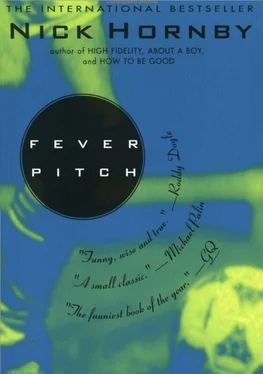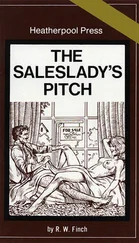This game against Stoke was very much in the mould—a goalless first half, and then, amid rising discontent, two late goals (ironically, given the towering height of Stoke’s several centre-halves, headed in by the two smallest players on the pitch, Sansom and Rollins). Nobody, not even someone like me, would have been able to remember the game had it not been for the post-match press conference, when Alan Durban became angered by the hostility of the journalists towards his team and his tactics. “If you want entertainment,” he snarled, “go and watch clowns.”
It became one of the most famous football quotes of the decade. The quality papers in particular loved it for its effortless summary of modern football culture: here was conclusive proof that the game had gone to the dogs, that nobody cared about anything other than results any more, that the Corinthian spirit was dead, that hats were no longer thrown in the air. One could see their point. Why should football be different from every other branch of the leisure industry? You won’t find too many Hollywood producers and West End theatre impresarios sneering at the public’s desire to be diverted, so why should football managers get away with it?
Over the last few years, however, I have come to believe that Alan Durban was right. It was not his job to provide entertainment. It was his job to look after the interests of the Stoke City fans, which means avoiding defeat away from home, keeping a struggling team in the First Division, and maybe winning a few cup games to alleviate the gloom. The Stoke fans would have been happy with a nil-nil draw, just as Arsenal fans are happy enough with nil-nil draws at Spurs or Liverpool or Manchester United; at home, we expect to beat more or less everyone, and we don’t particularly care how it is done.
This commitment to results means, inevitably, that fans and journalists see games in a profoundly different way. In 1969 I saw George Best play, and score, for Manchester United at Highbury. The experience should have been profound, like seeing Nijinsky dance, or Maria Callas sing, and though I do talk about it in that way sometimes, to younger fans, or those who missed out on Best for other reasons, my fond account is essentially phoney: I hated that afternoon. Every time he got the ball he frightened me, and I wished then, as I suppose I wish now, that he had been injured. And I have seen Law and Charlton, Hoddle and Ardiles, Dalglish and Rush, Hurst and Peters, and the same thing happened: I have not enjoyed anything these players have ever done at Highbury (even though I have, on occasions, grudgingly admired things they have done against other teams). Gazza’s free kick against Arsenal in the FA Cup semi-final at Wembley was simply astonishing, one of the most remarkable goals I have ever seen … but I wish with all my heart that I had not seen it, and that he had not scored it. Indeed, for the previous month I had been praying that Gascoigne would not be playing, which emphasises the separateness of football: who would buy an expensive ticket for the theatre and hope that the star of the show was indisposed?
Neutrals loved the glorious theatre of that Gascoigne moment, of course, but there were very few neutrals in the stadium. There were Arsenal fans, who were as horrified as I was, and Tottenham fans, who were just as thrilled with the second goal, a two-yard Gary Lineker tap-in after a scramble—in fact, they went even more berserk then, because at 2-0 after ten minutes Arsenal were dead and buried. So where is the relationship between the fan and entertainment, when the fan has such a problematic relationship with some of the game’s greatest moments?
There is such a relationship, but it is far from straightforward. Tottenham, generally regarded as being the better footballing team, are not as well-supported as Arsenal, for example; and teams with a reputation for entertaining (West Ham, Chelsea, Norwich) don’t get queues around the block. The way our team plays is beside the point for most of us, just as winning cups and championships is beside the point. Few of us have chosen our clubs, they have simply been presented to us; and so as they slip from the Second Division to the Third, or sell their best players, or buy players who you know can’t play, or bash the ball for the seven hundredth time towards a nine foot centre-forward, we simply curse, go home, worry for a fortnight and then come back to suffer all over again.
For my own part, I am an Arsenal fan first and a football fan second (and, yes, again, I know all the jokes). I will never be able to enjoy the Gazza goal, and there are countless other similar moments. But I know what entertaining football is, and have loved the relatively few occasions when Arsenal have managed to produce it; and when other teams who are not in competition with Arsenal in any way play with flair and verve, then I can appreciate that, too. Like everyone, I have lamented long and loud the deficiencies of the English game, and the permanently depressing ugliness of the football that our national team plays, but really, deep down, this is pub-speak, and not much more. Complaining about boring football is a little like complaining about the sad ending of King Lear , it misses the point somehow, and this is what Alan Durban understood: that football is an alternative universe, as serious and as stressful as work, with the same worries and hopes and disappointments and occasional elations. I go to football for loads of reasons, but I don’t go for entertainment, and when I look around me on a Saturday and see those panicky, glum faces, I see that others feel the same. For the committed fan, entertaining football exists in the same way as those trees that fall in the middle of the jungle: you presume it happens, but you’re not in a position to appreciate it. Sports journalists and armchair Corinthians are the Amazon Indians who know more than we do—but in another way they know much, much less.
ARSENAL v BRIGHTON
1.11.80
A nothing game, between two nothing teams; I doubt if anyone else who was there remembers anything about it at all, unless it was their first time, or their last time, and doubtless my two companions for the afternoon, my dad and my half-brother, had forgotten the occasion by the following day. I recall it only because (only because!) it was the last time I was at Highbury with my dad, and though we might well go again sometime (he has made a couple of very small noises recently) the game now has an end-of-an-era aura about it.
The team were in much the same state as we had found them twelve years before, and I am sure that he must have complained about the cold, and Arsenal’s ineptitude, and I am sure that I felt responsible for both, and wanted to apologise. And I wasn’t much different in important ways, either. I was still as gloomy, somehow, as I had been when I was a boy, although because I was now aware of this gloom, understood what it was, it seemed darker and more threatening than it had ever done before. And, of course, the team were still in there, mixed in with it all, leading these lows from the front or trailing them from behind, I don’t know which.
But other things had changed, permanently and for the better, particularly in my dealings with my “other” family. My stepmother had long ceased to be the Enemy—there was a real warmth in our relationship that neither of us could have anticipated years before—and there had never been any problem with the kids; but most important of all, my father and I, almost imperceptibly, had reached the stage where football was no longer the chief method of discourse between us. I lived with him and his family in London for the whole of the 80/81 season, my teacher training year; this was the first time we had had such an arrangement since I was a child, and it was fine. We had other stuff going on by now, as we have done ever since. The failure of his first marriage must still be mixed in there somehow, I suppose, but we have managed to fashion something that works well in its own way; and though there are still frustrations and difficulties, I don’t think that these are ruinous, or that the problems we have are any worse than my friends have with their fathers—indeed, we get along much better than most.
Читать дальше











